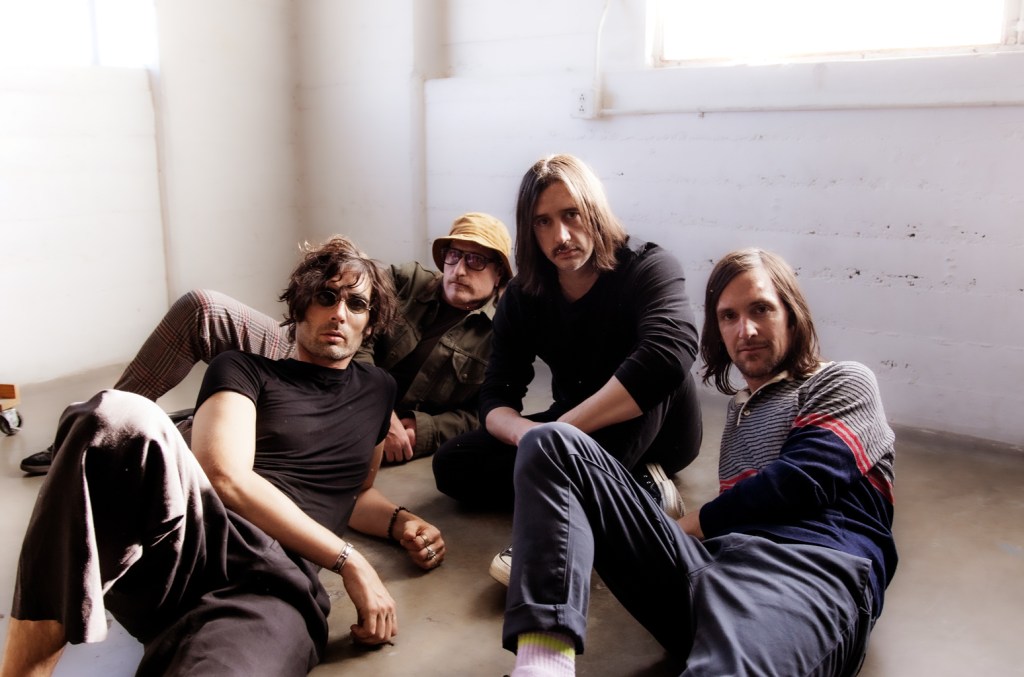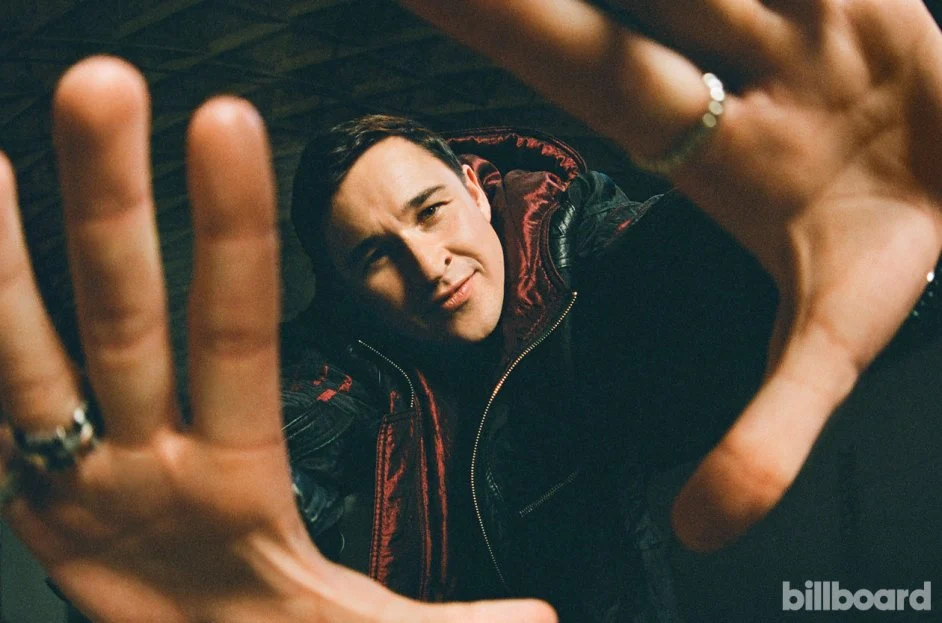SXSW
Trending on Billboard
All-American Rejects are set to kick off SXSW 2026 at the Music Festival Opening Party hosted at Stubb’s Amphitheater on March 12 in Austin, Texas. The festival and conference has also announced the first slate of artists set to play the iconic event’s 40th anniversary that will take place March 12-18 throughout the city.
The initial list of 100 showcasing artists will include masked lo-fi art-pop musician Milo Korbenski from Brighton, England; experimental electropop and live coding pioneer DJ_Dave out of LA; Mexico City-based and regionally influenced post-punk project La Texana; Brooklyn-based alt-folk songwriter Hudson Freeman; Austin-based Bayonne, the introspective and ethereal electro-pop project of artist Roger Sellers; Indonesian indie trio Grrrl Gang; Irish post-punks Chalk; LA punk-pop buzz band The Sophs; West Coast hip-hop and Bollywood influenced rapper, producer, and songwriter KOAD; Minneapolis-based singer-songwriter runo plum; and Grammy-nominated rapper and Tully founder Joyner Lucas.
“SXSW has been the premiere destination for music discovery for 40 years, helping push pioneering acts like Kendrick Lamar, The White Stripes, Wet Leg, PinkPantheress, Tyler, The Creator, and Billie Eilish, to the next level,” SXSW vp of music Brian Hobbs said in a release. “By bringing the global music industry to Austin, from labels and A&R to publicists to influential journalists and critics, SXSW is a unique opportunity for showcasing artists to build their careers, enter new markets, and learn from fellow artists and industry voices. With an extra night of showcases this year, 2026 is shaping up to be better than ever for artists, industry and audiences.”
For a full list of Showcasing Artists, head here.
SXSW will celebrate its 40th year in 2026 as a condensed festival and conference due to the closure of the Austin Convention Center that is undergoing extensive renovations. The event will be two days shorter than the 2025 edition, with its interactive, film/TV and music programs running concurrently.
The festival has also announced its initial list of Music Showcase Presenters that include returning brands Billboard, NPR Music Stations, Rolling Stone, British Music Embassy, Los Angeles Times’ De Los, BMG, BBC Introducing, and The Line of Best Fit, as well as first time presenters including Willie Nelson’s Luck Reunion, R&B Block Party and Dream Con. The full list of the first 50 Music Showcase Presenters can be found here.
As Billboard reported last month, for the first time, SXSW will feature a fully integrated seven-day schedule across its trio of core programs, with downtown Austin transforming into a creative village anchored by three “clubhouses” — Innovation at Brazos Hall, Film & TV at 800 Congress, and Music at The Downright — designed to simplify navigation and foster collaboration throughout the all-in-one event.
Billboard parent company Penske Media acquired a majority stake in SXSW in 2023 and helped expand its reach to three continents, now hosting flagship events in Austin, Sydney and London.
Trending on Billboard
Swapmeet and 水中スピカ Suichu Spica are winners of the third annual Justin Cosby Music Prize, presented following their respective appearances at South by Southwest Sydney 2025.
Hailing from Adelaide, Swapmeet scoops the Justin Cosby best emerging artist honor, awarded to the local or international artist showing the most potential, a nod to their artistic merit and “export readiness.”
Related
“Since we announced Swapmeet on the lineup, the band attracted a significant amount of industry interest thanks to their quality songwriting and cohesive production,” explains SXSW Sydney head of music Claire Collins. “Throughout the week, they backed up the buzz with a compelling show, producing gorgeous indie anthems punctuated by a punk spirit. We can’t wait to see what they do next.”
Meanwhile, Kyoto, Japan math rock act 水中スピカ Suichu Spica collect the Justin Cosby best performance prize, recognition of an outstanding live effort at an official SXSW Sydney event.
Their “flawless live sets throughout the week were one of the true highlights of SXSW Sydney this year,” says SXSW Sydney music program manager Reg Harris. “Each show featuring a tight setlist filled with intricate guitar tapping, sparkling vocals, ever changing time signatures and cinematic crescendos.”
Also, Jamaica Moana is named as recipient of the Walk to Austin Award, presented for the first time in partnership with Johnnie Walker Black Ruby. As part of their victory spoils, the trailblazing Māori/Samoan rapper and songwriter will perform at SXSW 2026 in Austin, Texas.
A music industry panel selected Moana on the basis of exceptional creativity, originality and potential to connect with a global audience.
The Justin Cosby Music Prize is named in the memory of Inertia Music co-founder Justin Cosby, who died in June 2021.
The much-loved independent music executive was a regular attendee at SXSW and his meticulously-prepared spreadsheet planner was shared widely among the Australian industry professionals making the journey to Austin each year, notes SXSW Sydney organizers in a statement.
The judging panel comprises industry leaders from independent record labels, community radio, venues, festivals and local and international media.
The inaugural Justin Cosby Music Prize was awarded in 2023 to Otoboke Beaver (best performance) and Miss Kaninna (best emerging artist), and was last year presented to Voice of Baceprot and DEVAURA.
TEG produced the third-annual SXSW Sydney, which was presented Oct. 13 – 19 and featured a program heaving with 1,600 events and networking sessions, plus a music festival lineup with more than 300 performances.
Billboard’s The Stage hit SXSW London on Thursday night (June 5), marking the first time the event took place in the U.K. The show at the capital’s Troxy was headlined by Lagos-born, London-based superstar Tems, a day after she collected the Diamond Award at the Global Power Players Event alongside Sir Elton John and EMPIRE […]
At the inaugural SXSW London taking place June 2-7, with nearly 900 speakers participating in some 500 sessions, one specific topic was of sharp relevance to the music industry — indeed, every industry and every attendee.
The climate crisis.
The past year saw extreme weather drive fires across the music capital of Los Angeles; a cyclone prompt cancellations of some two dozen live events in Australia in a single week; and more than 50 festivals in the U.K. either postponed or canceled due to forces including higher weather-related insurance costs.
“Climate change is not some distant threat,” said Leila Toplic, chief communications and trust officer of Carbonfuture, which provides verification of efforts to remove carbon from the atmosphere.
“The business case for taking action is still there,” remarked Helen Clarkson, CEO of the the Climate Group, a non-profit whiich has worked with more than 500 multinational businesses in 175 markets. (She spoke during a panel provocatively entitled “Canceling Sustainabilty,” about efforts to purse a green agenda in the face of new anti-environmental rhetoric in Washington, D.C.)
SXSW London organizers tapped the Bellwethers Group, which is focused on building a green economy, as its the official sustainability partner and the company hosted several days of panels at the Nature and Cimate House.
One of those panels focused on the role that advertising and public relations agencies can play in guiding businesses which claim to be concerned about the climate. Lameya Chaudhury, head of social impact for the mission-driven creative agency Luck Generals, remarked: “The question we’re asking of clients in 2025 is — did you really f–king mean it?”
SXSW London builds on the four-decade legacy of the South By Southwest music, arts, film and tech conference and festival launched in Austin, Texas, in 1987. Two years ago, Penske Media (the owner of Billboard) took a majority interest in the company which now presents conferences in Austin; Sydney, Australia; and now in the formerly industry district of Shoreditch in East London.
The climate-focused discussion that hit closest to home for the music industry took place Wednesday morning. Billed as “The Future of Sustainable Live Events,” it was moderated by Claire O’Neill, CEO and co-founder of the international nonprofit A Greener Future and co-founder of green energy specialists, Grid Faeries.
Panel participants included Sam Booth, director of sustainability for AEG Europe; Alex Bruford, founder, managing director and agent with ATC Live, whose clients include The Lumineers and Fontaines DC; and Mark Stevenson, co-founder of CUR8, whose mission is to remove 1 billion tons of carbon a year from the atmosphere.
Here are five key takeaways from their discussion.
Follow The Leaders
The performance this week by Nigerian star TEMS is one eagerly awaited moment at the inaugural SXSW London, which opens Monday (June 2) and runs through Saturday (June 7), building on the four-decade legacy of the South By Southwest music, arts, film and tech conference and festival launched by four young colleagues in Austin, Texas, in 1987.
TEMS will headline The Stage at SXSW London on Thursday (June 5) in an exclusive concert presented by Billboard at London’s iconic music venue Troxy. She was featured on the cover of the magazine’s May 17 issue.
London is some 4,900 air miles from Austin where, in the mid 1980s, the idea of a conference and festival, initially focused on music, was hatched by the co-founders of SXSW: Roland Swenson, Louis Jay Meyers, Louis Black and Nick Barbaro. At the first event, held in March 1987, an expected 150 registrants reached 700 on the opening day.
In 2021, following the challenges of the pandemic, SXSW gained an investment partner in Penske Media Corporation (which also owns Billboard) and the film and production company MRC. Two years later, Penske took majority ownership of SXSW.
Under its new owners, SXSW has gone global. The third SXSW Sydney will take place in Australia’s largest city from Oct. 13-19.
This first SXSW London takes place at a time when the creative industries of the United Kingdom are more vital than ever, with the music business finding global success with superstars like Dua Lipa, Charli xcx, Coldplay and others. The event also follows the publication by Billboard of its annual Global Power Players list and its first U.K. Power Players list, whose honorees will be recognized at an invitation-only gathering.
Here are seven highlights to watch for at SXSW London.
By the Numbers
Hugh Forrest is out at South By Southwest, four months after assuming leadership of the music, tech and film conference, following a decision by the SXSW board to select Penske Media Corporation executive Jenny Connelly to lead the festival, Billboard has learned.
Connelly, a longtime executive vp of product and technology at PMC and a SXSW board member, has been appointed director in charge of the annual event in Austin. Consequently, Forrest was offered the opportunity to retain his titles as president and chief programming officer, reporting to Connelly in her new role, according to PMC. “When Hugh was told he wasn’t going to get the CEO role at SXSW, and would be reporting to her, Hugh made the decision to leave SXSW,” said the spokesperson for PMC, which has had control of SXSW for two years and is also Billboard‘s parent company.
Since joining PMC in late 2017, Connelly has overseen multiple teams responsible for engineering, data, IT, product and SEO, and also leads the subscriptions and email teams. Pre-PMC, Connelly was senior vp of product at Dreamworks NOVA, tasked with bringing that company’s 3D imaging technology to other industries. Earlier, she spent seven-plus years at Live Nation Entertainment, rising to senior vp of digital at Live Nation Studios.
Trending on Billboard
Connelly is based in Los Angeles but has begun traveling to Austin on a weekly basis, the company said.
“I’m happy to announce that after 3+ years on the SXSW board of directors, I’m now working as Director in Charge of SXSW,” she said in a social post on Tuesday (April 29), adding she’s “working with a killer group of dedicated, creative & skilled people who throw the world’s most influential festival. We are dreaming up the evolution of this event, so that SXSW never stops helping creative people achieve their goals.”
Several other key moves were announced Friday (April 25) during a company town hall as part of ongoing succession planning at the festival, the PMC rep said, along with additional promotions for festival veterans Peter Lewis, Greg Rosenbaum and Brian Hobbs. The organization said it has several open jobs to fill at SXSW.
Forrest declined to comment on last week’s chain of events when reached by Billboard but remarked in a statement over the weekend that “leaving South by Southwest was definitely not my decision,” adding, “I put my heart and soul into this event for more than 35 years, and I was looking forward to leading several more editions.”
Hugh Forrest speaks onstage during the 2023 SXSW Conference at Austin Convention Center on March 10, 2023.
Diego Donamaria/Getty Images
Forrest joined SXSW in 1989, when it was in its nascent stage, and spent the bulk of his tenure as chief programming officer. In 2022, he was promoted to co-president alongside then-chief brand officer Jann Baskett, succeeding the retiring CEO Roland Swenson. Forrest became the sole president late last year following Baskett’s departure to start her own consultancy.
As president, Forrest had been tasked with driving business growth and collaborating closely with the event’s board of directors, which includes co-founder Swenson, Jay Penske (CEO of Penske Media and SXSW’s largest shareholder) and Amy Webb (CEO of the Future Today Institute), among others.
The company told Billboard that the 2025 edition achieved the highest sponsorship revenue in the event’s history, while the SXSW EDU conference had its best turnout since its 2011 founding.
The Austin Chronicle hinted at a wider staffing shakeup at SXSW, reporting on Saturday (April 26) that “another 10 or more staff members … have left the company, either through previously planned departures or unexpectedly.” One departure, James Minor, the vp and head of music at the conference, was one of those planned exits. Minor told the Austin American-Statesman on Sunday he “already had plans to leave SXSW in motion for the fall.”
Founded in 1987 by Swenson, Nick Barbaro, Louis Black and Louis Jay Meyers, SXSW has grown into a globally influential event in Austin, which also now includes satellite events like the two-year-old SXSW Sydney and the upcoming debut of SXSW London, which launches in June. Swenson, who led SXSW for 36 years, transitioned to executive chairman in 2022.
The leadership change follows a recent announcement that next year’s conference will be on the shorter side, running from March 12-18, with interactive, film/TV and music programs happening concurrently. The reduction in days — and by extension, the number of showcasing music artists and shows — is due to the $1.6 billion redevelopment of the Austin Convention Center, which is underway. The new center, expected to open in 2029, will nearly double its size and focus on accessibility and sustainability. “A shorter SX gives attendees more of a chance to be here for the entire run,” a spokesperson told Billboard at the time.
Note: Billboard’s parent company PMC is the largest shareholder of SXSW and its brands are official media partners of SXSW.

SXSW London announced the initial batch of showcasing performers for the first-ever U.K. edition of the iconic music festival on Monday morning (April 7). Taking place from June 2-7 in Shoredictch, U.K., the event will feature sets from Mabel, Alice Glass, Sasha Keable, Miraa May and NAO, who will take the stage at more than a dozen venues, including Shoreditch Town Hall, Notion, Soul Surge, The Blues Project, Village Underground, Strongroom Bar, 93 Feet East, XOYO, Brick Lane Tap House, Colours, Juju’s and Jaguar Shoes, among others.
Among the other 100 Afrobeats, dancehall, blues, drill, drum & bass, dub, electronic, folk, funk, grime, hip-hip, jazz, metal, rock and soul acts from around the world slated to perform are: Aja Ireland, Ace Clvrk, Anthonia, Balter, Bemz, Benefits, Bison Rogue, Caleb Kunle, Cheb Mimo, Clara Serra Lopez, Coco & Breezy, Demae, Emmeline, Freddie Lewis, Gender Crisis, Gia Ford, Heartworms, Hiba, Hot Face, Hunnid22, Joejas, Kanis, Last Nubian, Lostchild, Mace the Great, Myylo, Nicole Blakk Sola Akingbola, The Deep, TwstXav and Zems, among many others.
Trending on Billboard
In addition to the traditional mix of music from all over the world offered at the annual fest in Austin, TX, the first-ever U.K. edition will feature conference programming covering the intersection of AI technology and human creativity and the crafting of branded product experiences, as well as the SXSW London Screen Festival, with appearances from actress Gillian Anderson and screenings of upcoming films and TV series.
Among the other musical acts slated to perform at the event that will feature such themes as “Diasporic Electronica,” “Independent Spirit” and “Future Sounds” are: Blasé, Cooper T, Deca Ota, El Combo De London, Gbrl Prkfv Ensemble, Ivy Lab, Jaz Elise, Korda Korder, Lewis G Burton, Majur, Mayelli, Micromoon, Montanera, Polldarier, Ras-I, Sarah Angel, Sean Focus, Tatyana, SophieGrey and Werkha, among others.
“One of the things I love most about London is that you can step out of any tube station and find yourself in a distinct community,” said SXSW London head of music Adem Holness in a statement. “That’s exactly how I want our festival to feel — each of our music venues will be a gateway into a different international new music scene. We’re collaborating with the most exciting pioneers in underground music movements to present the future of music from their unique perspectives, and I’m beyond excited by the artists they’ve chosen to platform.”
Three-day passes are available now here, with music wristbands slated to go on sale on April 14.
Billboard’s parent company PMC is the largest shareholder of SXSW and its brands are official media partners of SXSW.
Austin’s annual SXSW conference and festival is set to scale back its 2026 edition. Next year, the event will run from March 12-18 — two days shorter than this year’s event — with its interactive, film/TV and music programs running concurrently. The news was first reported by the Austin American-Statesman. “A shorter SX gives attendees […]
03/16/2025
With support from Jordan Miller and Nala, the producer closed out Billboard’s trio of shows at SXSW 2025.
03/16/2025
Grupo Frontera and Majo Aguilar brought the Mexican Spice to Billboard THE STAGE at SXSW. Keep watching for a sneak peek of the second night! Narrator: Frontera had everyone in their feels last night at Billboard’s The Stage at SXSW in Austin, and we have all the details! The guys were a total vibe in […]

 State Champ Radio
State Champ Radio 









